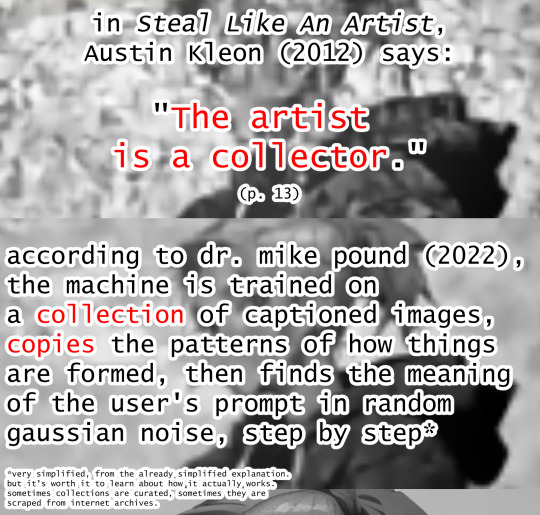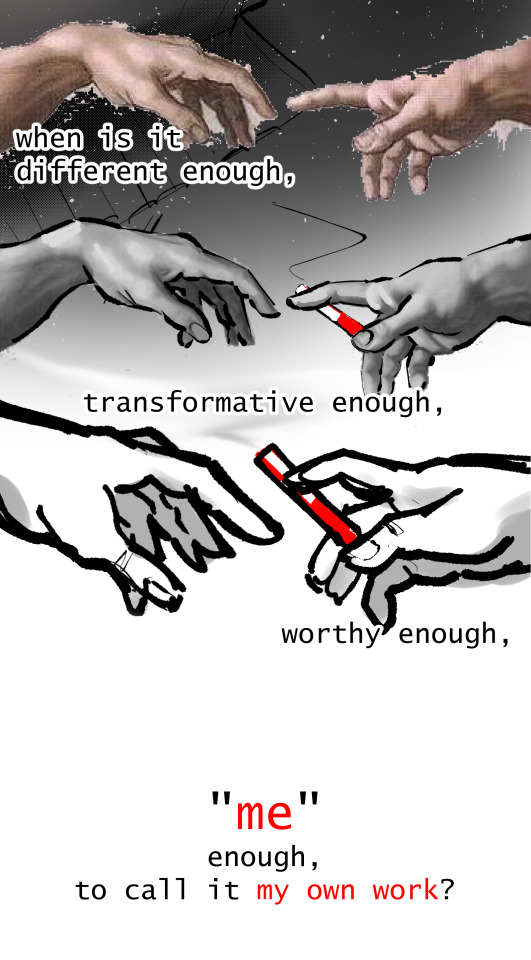#Conversational AI Tools
Explore tagged Tumblr posts
Text
Mastering the Art of Traffic & Leads with ChatGPT
Ever felt swamped by the need to create new content and draw in leads? I’ve been there. As a digital marketer, I spent hours brainstorming and planning. Then, I found ChatGPT, and it transformed my work. This AI tool changed how I market, create content, and get leads. ChatGPT is a smart AI from OpenAI. It can write emails, essays, and chat1. It’s not just a tool; it’s a big change for writers,…
#AI Chatbots for Traffic#AI-Powered Lead Conversion#ChatGPT for Business Growth#ChatGPT Marketing Solutions#Conversational AI Tools#Effective Lead Nurturing#Lead Generation Strategies#Personalized Customer Engagement#Traffic Optimization Techniques
0 notes
Text
Getting your info on AI purely from tumblr communists will really warp your brain. And I don't just mean the anti-AI tumblr communists, which most of them are. Pro-AI tumblr communists will talk about AI like "This is a tool for the radical collective ownership of art. We are taking a stance against the opressive capitalistic system of copyright that abuses artists for the benefit of large corporations. Art is owned by no one. Art is owned by everyone." And then you step into the real world and AI is being used as a copyright grift to siphon money from creators using youtube's absolutely broken content id. Youtube, of course, being owned by google; the massive multi-trillion dollar company that is investing billions into AI.
youtube
#ai#copyright#anti-ai#tumblr users: *points at giant tech conglomerates* is this anti-establishment and communist?#i mean my mutuals on tumblr dot gov hate it so it MUST be an opressed and countercultural tool that i have to fight to protect#sorry but 'noooo you are criticizing big tech WRONGLY you have to be MORALLY PERFECT while critiqueing this multibillion dollar industry–#or else you are HARMING SOCIALISM' is just not a very convincing argument to me.#yeah yeah i'm sure this tumblr blog was actually very regressive in their criticism of ai#self-policing must be our top priority in this conversation#socialism thanks you. as well as the private equity firms pumping billioms into this technology. two things that are perfectly compatible.
17 notes
·
View notes
Text
How AI & Machine Learning Are Changing UI/UX Design

Artificial Intelligence (AI) and Machine Learning (ML) are revolutionizing UI/UX design by making digital experiences more intelligent, adaptive, and user-centric. From personalized interfaces to automated design processes, AI is reshaping how designers create and enhance user experiences. In this blog, we explore the key ways AI and ML are transforming UI/UX design and what the future holds.
For more UI/UX trends and insights, visit Pixelizes Blog.
AI-Driven Personalization
One of the biggest changes AI has brought to UI/UX design is hyper-personalization. By analyzing user behavior, AI can tailor content, recommendations, and layouts to individual preferences, creating a more engaging experience.
How It Works:
AI analyzes user interactions, including clicks, time spent, and preferences.
Dynamic UI adjustments ensure users see what’s most relevant to them.
Personalized recommendations, like Netflix suggesting shows or e-commerce platforms curating product lists.
Smart Chatbots & Conversational UI
AI-powered chatbots have revolutionized customer interactions by offering real-time, intelligent responses. They enhance UX by providing 24/7 support, answering FAQs, and guiding users seamlessly through applications or websites.
Examples:
Virtual assistants like Siri, Alexa, and Google Assistant.
AI chatbots in banking, e-commerce, and healthcare.
NLP-powered bots that understand user intent and sentiment.
Predictive UX: Anticipating User Needs
Predictive UX leverages ML algorithms to anticipate user actions before they happen, streamlining interactions and reducing friction.
Real-World Applications:
Smart search suggestions (e.g., Google, Amazon, Spotify).
AI-powered auto-fill forms that reduce typing effort.
Anticipatory design like Google Maps estimating destinations.
AI-Powered UI Design Automation
AI is streamlining design workflows by automating repetitive tasks, allowing designers to focus on creativity and innovation.
Key AI-Powered Tools:
Adobe Sensei: Automates image editing, tagging, and design suggestions.
Figma AI Plugins & Sketch: Generate elements based on user input.
UX Writing Assistants that enhance microcopy with NLP.
Voice & Gesture-Based Interactions
With AI advancements, voice and gesture control are becoming standard features in UI/UX design, offering more intuitive, hands-free interactions.
Examples:
Voice commands via Google Assistant, Siri, Alexa.
Gesture-based UI on smart TVs, AR/VR devices.
Facial recognition & biometric authentication for secure logins.
AI in Accessibility & Inclusive Design
AI is making digital products more accessible to users with disabilities by enabling assistive technologies and improving UX for all.
How AI Enhances Accessibility:
Voice-to-text and text-to-speech via Google Accessibility.
Alt-text generation for visually impaired users.
Automated color contrast adjustments for better readability.
Sentiment Analysis for Improved UX
AI-powered sentiment analysis tools track user emotions through feedback, reviews, and interactions, helping designers refine UX strategies.
Uses of Sentiment Analysis:
Detecting frustration points in customer feedback.
Optimizing UI elements based on emotional responses.
Enhancing A/B testing insights with AI-driven analytics.
Future of AI in UI/UX: What’s Next?
As AI and ML continue to evolve, UI/UX design will become more intuitive, adaptive, and human-centric. Future trends include:
AI-generated UI designs with minimal manual input.
Real-time, emotion-based UX adaptations.
Brain-computer interface (BCI) integrations for immersive experiences.
Final Thoughts
AI and ML are not replacing designers—they are empowering them to deliver smarter, faster, and more engaging experiences. As we move into a future dominated by intelligent interfaces, UI/UX designers must embrace AI-powered design methodologies to create more personalized, accessible, and user-friendly digital products.
Explore more at Pixelizes.com for cutting-edge design insights, AI tools, and UX trends.
#AI in UX Design#Machine Learning UX#UX Personalization#Conversational UI#Predictive UX#AI Chatbots#Smart UX Tools#UI Automation#Voice UI Design#Inclusive UX Design#Sentiment Analysis in UX#Future of UX#AI UX Trends 2025#Figma AI Plugins#Accessibility with AI#Adaptive UI Design#UX Innovation#Human-Centered AI#Pixelizes Blog#UX Strategy
2 notes
·
View notes
Text
Features of Our AI To Human Text Converter
However, not all AI-generated text is fit for human consumption without some level of refinement. That's where the AI To Human Text Converter comes in, a free tool that turns robotic-sounding AI content into natural, human-readable text. Let's dive into the key features that make this tool an indispensable resource for anyone looking to humanize AI-generated text effortlessly.
1. Simple and User-Friendly Interface
One of the standout features of our AI To Human Text Converter is its simple, user-friendly interface. Many people shy away from using complex tools that require a steep learning curve. Fortunately, this converter is designed with ease of use in mind. The interface is intuitive, allowing users to quickly navigate the platform and convert their AI-generated text into human-like content within seconds. There's no need to struggle with confusing menus or spend time learning how to use the tool.
2. Safe and Secure to Use
Safety is paramount when it comes to using online tools, especially for text conversion. AI To Human Text Converter ensures that users' data is protected through secure browsing measures. The website is well-secured, minimizing any risks of data breaches or security threats. Whether you're a content creator, student, or professional, you can confidently use the tool without worrying about jeopardizing your safety.
3. Accurate Conversion of AI-Generated Content to Human-Like Text
The primary feature of the AI To Human Text Converter is its ability to transform AI-generated content into human-readable text. Utilizing advanced algorithms, the tool analyzes the input and produces an output that closely mimics the natural flow of human writing. Whether you're converting AI content for essays, blog posts, or marketing materials, this tool ensures the end result is clear, engaging, and free of robotic phrasing.
4. No Limitations – Unlimited Usage
One of the most attractive features of the AI To Human Text Converter is its unlimited usage policy. Unlike other tools that impose restrictions or require subscriptions after a certain number of conversions, our tool is completely free with no limitations. You can convert as much content as you need, whenever you need it. This makes it an ideal solution for content creators, bloggers, and students with large volumes of AI-generated text to convert.
5. Fast and Efficient Processing
Time is a valuable commodity, and with our AI to human text converter, speed is a top priority. The tool processes your content in seconds, delivering humanized text quickly and efficiently. Whether you have a single paragraph or an entire document to convert, you can trust that the tool will provide results without delays.
6. No Authentication Needed
Another significant advantage of AI To Human Text Converter is that you don’t need to create an account, sign up, or log in. The tool is ready for immediate use, allowing you to convert text as soon as you arrive at the website. This no-authentication feature ensures a hassle-free experience, making it easy for users to get started right away.
Why Choose AI To Human Text Converter?
If you're looking for a reliable and efficient way to humanize your AI-generated content, AI To Human Text Converter is the perfect choice. Here are some key reasons why you should consider using this tool:
Free of Cost: Our tool is completely free to use, with no hidden fees or subscription costs.
Unlimited Use: Convert as much AI content as you need without worrying about restrictions.
No Login Required: Enjoy immediate access to the tool without needing to create an account.
Fast Conversion: Save time with near-instant results that transform AI text into human-like content.
User-Friendly: The intuitive interface makes it easy for anyone to use, even without prior experience.
The AI To Human Text Converter is packed with features that make it an excellent choice for anyone looking to convert AI-generated content into natural, human-readable text. Its simple interface, fast processing, and unlimited usage ensure that you get the best results without any hassle. Plus, with top-notch security measures in place, you can use the tool confidently and safely. Whether you’re a student, content creator, or professional, this tool is designed to meet all your text conversion needs.
Try the AI To Human Text Converter today and experience the difference for yourself!
#AI to human text#AI to human text converter#human-readable text#convert AI-generated content#humanize AI text#free AI to human text converter#secure text converter#AI content converter#unlimited AI text conversion#AI text tool#AI text to human-readable content#convert AI text for essays#convert AI text for blog posts#no login required AI tool#fast AI text conversion#user-friendly AI text converter#free online AI to human text tool#secure browsing AI tool#advanced AI text conversion algorithms#AI content transformation#hassle-free AI content conversion#fast and efficient AI text tool#unlimited usage AI text converter#no subscription AI tool#AI text humanization tool
5 notes
·
View notes
Note
hey heads up that the post you reblogged from vangoghcore is AI "art"
yo!! ty to you and the 3 other people who sent me asks about this. i tagged the post so its clear that its AI generated
#thanks for letting me know everyone! i try to be careful but im often on tumblr late at night with no braincells left#im down to write a whole thing about my stance on AI art if anyone's curious#i work in the animation industry so ive had dozens of conversations about this w other professionals#but it basically boils down to: ai image generation is a tool that can be very useful to us and also very dangerous to us#i think it should be regulated & used ethically but i dont want to deny its existence. i think it can be useful to brainstorm and find idea#among other things#rabicano#ask#that particular post feels ok to me cause its very obvious that its AI altho i wish OP had put it in the desc and not just in tags
13 notes
·
View notes
Text
Reddit Community Intelligence: New AI-Powered Ad Tools Revolutionize Marketing
Reddit has officially entered the AI-powered advertising space with the launch of its new suite, Reddit Community Intelligence. Announced at the prestigious Cannes Lions International Festival of Creativity 2025, these new tools promise to redefine how brands extract value from Reddit’s massive database of user discussions. What Is Reddit Community Intelligence? After two decades of user-driven…
#AI advertising#AI marketing tools#Cannes Lions 2025#Conversation Summary Add-Ons#Jackbox Games#Lucid#Publicis Media#Reddit AI#Reddit Insights
0 notes
Text
Best AI Tools to Detect Customer Hesitation on Your Website
In the current competitive online market, it's not just a matter of wowing visitors to your site — you need to convert them. But what if a potential customer hesitates at the conversion point? That's where AI tools enter. By recognizing hesitation and intervening in real time, companies can lower bounce rates and improve conversions enormously.
In this article, we'll take a look at the top AI tools to identify customer hesitation and how you can leverage them to convert indecision into action.
Why Identifying Customer Hesitation Is Important
Customer hesitation is usually a silent indicator. A visitor could spend excessively long on a product page, hover for an extended period of time over the "Buy Now" button, or continually click between tabs. Such behavior suggests uncertainty, distrust, or a requirement for more details.
If your website does not respond to such signals, the visitor might drop the journey altogether. This is why using AI tools to identify and respond to hesitation in real-time is an intelligent decision.
Best AI Tools to Identify Customer Hesitation
The following are the top AI-powered tools that can identify and respond to customer hesitation efficiently:
1. Hotjar AI Insights (Behavior Analytics)
Hotjar has been a pioneer in session recordings and heatmaps for a long time, but their latest AI-based tools bring user behavior analysis to a whole new level. Applying machine learning to analyze where users scroll, pause, or hesitate, Hotjar provides real-time behavior insights.
Top Features:
AI-powered session recordings
Scroll and movement heatmaps
Integration of user feedback
Detection of rage clicks or hesitation areas
Use Case: Instantly find where users are confused or lose interest.
2. Crazy Egg AI Reports
Crazy Egg employs artificial intelligence to recognize hesitation patterns and provide optimization recommendations. It reports where users stall, where they're stuck, and even where they're likely to convert.
Major Features:
AI-based heatmaps
Smart traffic segmentation
Real-time session recording
A/B testing with AI recommendations
Use Case: Find hesitation and optimize page elements such as CTAs and prices.
3. Zoho PageSense
Zoho PageSense is a robust AI conversion optimization platform that makes more than just rudimentary tracking possible. It employs behavioral analysis and AI-facilitated segmentation to identify hesitation and then automatically test against personalized content.
Key Features:
AI heatmaps and session replays
Exit intent and hesitation tracking
Smart personalization tools
Goal-based targeting
Use Case: Deliver targeted offers or messages based on user hesitation signals.
4. Tidio AI Chatbots
Chatbots have the potential to play a central role in smoothing out customer uncertainty. Tidio, an AI-powered chatbot, detects when users hesitate, linger on a page, or exhibit exit intent. The chatbot can then greet them with targeted messages, FAQs, or promotions.
Key Features:
Behavior-triggered chat by AI
Support for CRMs
Customizable workflows for chatbots
Response suggestions based on NLP
Use Case: Automate engaging uncertain users before they bounce.
5. FullStory (Digital Experience Intelligence)
FullStory employs powerful AI to give rich user journey insights, identifying frustration cues, hesitations, and drop-off points. It flags sessions where users behave abnormally, typically a marker of confusion or uncertainty.
Key Features:
Frustration cues such as rage clicks and dead clicks
Machine learning event identification
Smarts funnel analysis
User sentiment analytics
Use Case: Identify where exactly users hesitate and why.
How to Select the Best Tool
When selecting an AI tool to identify hesitation, consider the following:
Integration: Make sure it is easy to integrate with your website and other analytics tools.
Real-Time Capabilities: Search for tools that identify hesitation in real-time, not only in reports.
Automation: Tools that respond automatically to hesitation (e.g., with pop-ups or chatbots) give the best ROI.
Ease of Use: Select platforms that provide visual dashboards and don't need technical expertise.
Turning Insight into Action
Detection is only the tip of the iceberg. After hesitation has been detected, AI can further assist with:
Personalized offers or messages
Real-time chat support
Dynamic content optimization
Exit-intent popups with rewards
With the union of detection and response, you are able to drastically boost conversions and enhance the user experience overall.
Final Thoughts
Customer hesitation tends to be subtle, yet it is one of the most important signals for potential conversions. With the help of AI tools such as Hotjar, Crazy Egg, Tidio, and FullStory, you can get a very good understanding of customer behavior and take action right away.
Whether you have an eCommerce store, a SaaS product, or a lead-gen site, these tools assist you in converting hesitation into action and browsers into buyers.
#Customer conversion#Convert hesitant buyers#AI tools for sales#Shopper behavior analysis#Sales funnel optimization#Behavioral targeting#Real-time personalization
0 notes
Text
Automate, Elevate, and Build a Business That Works for You with Caroline Hobbs

Key Takeaways Automating systems and setting clear expectations are the keys to building a scalable, sustainable business. Agents should start with their personal sphere and consistently ask for the business without fear. Leveraging AI and SOPs empowers agents to save time and focus on income-producing tasks. United States Real Estate Investor The REI Agent with Caroline Hobbs https://youtu.be/rpR6yoX4TIg Follow and subscribe to The REI Agent on social Facebook Instagram Youtube .cls-1fill:#fff; Linkedin X-twitter United States Real Estate Investor It's time to have an investor-friendly agent on your team! It's time to have an investor-friendly agent on your team! United States Real Estate Investor From Open Houses to Ownership: Caroline Hobbs’ Rise to Real Estate Mastery In this eye-opening episode of The REI Agent Podcast, Mattias hosts the extraordinary Caroline Hobbs, a powerhouse in real estate, tech, and team building. While Erica is out for physical therapy, Mattias flies solo to spotlight a woman whose story screams resilience, vision, and innovation. Caroline isn’t just a top-producing agent. She’s the founder of Reward Realty, one of California’s youngest-ever brokers, and the brain behind a revolutionary real estate CRM that’s changing how agents work nationwide. “I graduated college in 2009—arguably the worst time in history to try and get a job in finance.” Her story begins with inherited wisdom. As a third-generation real estate expert, Caroline was practically born to build an empire. What started with open houses during college soon transformed into a thriving brokerage, and eventually, a pioneering tech company designed for agents by an agent. Starting Young, Going Big: The Journey of a 21-Year-Old Broker Caroline doesn’t just talk the talk—she’s lived every part of it. At just 21, she became a licensed broker, stepping into an industry most were fleeing during the housing crash. Her mentor, a Keller Williams legend with over 10,000 contacts in her database, gave Caroline the tactical experience to thrive in chaos. “I was probably the youngest broker in the state for a while… because I graduated early and the experience rule hadn’t kicked in yet.” That early exposure to system-building and data management laid the foundation for something bigger: leading her own team, then creating a platform that helps others do the same, faster, smarter, and more profitably. Real Brokerage, Real Growth, Real Results Fast forward to today, Caroline’s team under Real Brokerage has grown from 4 to 9 agents in just four months. Her secret? Monthly masterminds, relentless expectation setting, and systems that allow every team member to build sustainably. “We teach people how to treat us—but we also set the expectations for our clients, our team, and our business.” She’s not just closing deals. She’s mentoring minds and building leaders. From showings to SOPs, Caroline’s influence runs deep in every aspect of her operation. She reminds us that real leadership is built on communication, follow-through, and vision. The Software That’s Reshaping the Agent's Life Caroline’s CRM isn’t just another shiny object, it’s a full-stack assistant that reads documents, transcribes calls, tracks deadlines, and automates client communication. “We help agents build out their SOPs, automate their transactions, and create time-saving systems that actually serve them.” With integrations into DocuSign, Dropbox, Fellow, and custom pipelines, it’s a plug-and-play system that frees up time for what matters: serving people. The CRM even uses AI to summarize phone calls, schedule follow-ups, and trigger marketing automations. It’s the very definition of working smarter, not harder. Train Like a Pro with Caroline’s AI Roleplay Coach Caroline also created a custom GPT tool for her team that roleplays lead conversations, provides feedback, and trains agents on how to confidently convert calls into clients. “It gives them
real-time feedback on what they did well and how they can improve—and it’s trained with Tom Ferry and Phil Jones language.” New agents use it daily to sharpen their skills before ever picking up a phone. She understands that the biggest gaps in success are often confidence and preparation, and she’s built tools to bridge both. Want More Deals? Ask for the Business. When Mattias asked Caroline for one golden nugget for new agents, she didn’t flinch. “Start with your sphere and ask for the business. Don’t be shy to say, ‘Do you know anyone looking to buy or sell?’” Her advice is refreshingly practical—start face-to-face, lean on your community, and build your skills over time. AI and automation are tools, but relationships and reputation are still the foundation. Final Words of Wisdom from a Trailblazer To close out the episode, Caroline recommends the game-changing book Buy Back Your Time by Dan Martell. “You should be out making the sales, not buried in paperwork. Automate and delegate everything else.” From strategy to software to soul, Caroline Hobbs embodies what The REI Agent is all about: building wealth while staying aligned with who you are and what matters most. Want to work smarter, lead better, and live bolder? Start by asking better questions. Caroline did, and it changed everything. Stay tuned for more inspiring stories on The REI Agent podcast, your go-to source for insights, inspiration, and strategies from top agents and investors who are living their best lives through real estate. For more content and episodes, visit reiagent.com. United States Real Estate Investor Create healing and connection within yourself, your family, and your community. Create healing and connection within yourself, your family, and your community. United States Real Estate Investor Contact Caroline Hobbs Reward Realty Linktree United States Real Estate Investor Mentioned References Buy Back Your Time by Dan Martell Tom Ferry Phil Jones Real Brokerage Google Forms ChatGPT United States Real Estate Investor Transcript Welcome to the REI Agent, a holistic approach to life through real estate. I'm Mattias, an agent and investor. And I'm Erica, a licensed therapist. Join us as we interview guests that also strive to live bold and fulfilled lives through business and real estate investing. Tune in every week for interviews with real estate agents and investors. Ready to level up? Let's do it. Welcome back to the REI Agent. It's your friendly local neighborhood real estate agent podcast host, Mattias, an investor. We are not, we don't have Erica with us today. So unfortunately, she had to go to PT. So we will hopefully have her here on the next one. But we did have a great guest today, Caroline Hobbs. Caroline is a team lead. She's an experienced agent, broker, and now a software owner. She has a CRM that she sells that has a lot of automations and stuff built in. It's pretty cool. So definitely check out the show notes if you are interested in hearing more about that. She can, you can see where, you know, in her link tree what all is available. I think that in this business, there's a lot of shiny objects. There's a lot of people that are trying to kind of get your money and can be distracting. Sometimes we get focused or persuaded into something. It could be changing brokerages. It could be, you know, this new tool that's fun. It could be a new system. I'm certainly guilty of this stuff. But I think at the end of the day, if you are focused on providing your clients with consistent, clear communication and you're setting expectations, you're going to do really well. So if you focus on those as the core tenement, and if you are building out systems and processes that help enhance that, I think that's what's really key in business that you already have. That's not necessarily something that will help you gain more business, other than people might rave about your services because they felt like they were taken care of the whole time.
So no matter what you do in this business, no matter what kind of things that you look into, because I think, you know, systems and processes and software, AI, all that stuff can be incredibly powerful. Just don't lose sight of what's really important when you are interacting with your clients. I think that's the key there. But without further ado, I'm going to keep this one short. We're going to go right into Caroline Hobbs. She, again, is out of the Silicon Valley area. She is an experienced agent. She may have been, and she talks about this, the youngest broker in the whole state of California for a couple months. So without further ado, Caroline Hobbs. Welcome back to the REI Agent. I am here with Caroline Hobbs. Caroline, thanks so much for joining us today. Thanks for having me. Hey, Caroline, you got a couple different hats. You have been an agent for a while. You've now team lead and you own a software company, correct? Correct. Yeah, awesome. To get started, I want to dive into all this different stuff, but let's get started by just kind of hearing how you got into real estate to begin with. Yeah, definitely. So I am third generation in real estate. So you could kind of say that I was born into it. My grandfather used to flip properties. He was a contractor. And after my mom graduated college, he encouraged her to go on and get her real estate license, which she did. She worked for Fieldstone down in Southern California, selling new homes for years and years, and eventually moved over to the lending side of things. While I was in college, I got a part-time job. I had no intention of going into real estate, as I have my degree in finance, but got a job hosting open houses for a realtor in Palo Alto and decided that I liked it. So shortly after graduation, I got my broker's license and a few years after that, started my independent brokerage. Nice. Wow, that's awesome. So you jumped right into starting your own brokerage, not just a new team. You went right into being your own broker. Well, so the realtor that trained me, just to give you a little bit of perspective, I started working for her in 2008, 2007, something around right there, and right at the heat of the crash as the market was crumbling. I graduated college. You needed to get into it. I graduated college in 2009, which is basically the worst time in history to try and get a job in finance. I was still working with the agent that trained me, and honestly, I couldn't have asked for a better mentor. The woman who I got to work with, she was internationally ranked as the top-selling agent in all of Keller Williams. She had a database at the time of over 10,000 people, which this is before people used databases. So I was hosting her open houses. I was organizing all of her clients in her database. I got a lot of really tactical, hands-on experience for how to manage contacts, how to stir the pot and turn that into actual business. So I worked with her for the first five, six years of my career, and then I was teaching a lot of classes at Keller Williams. I went off. I became an independent agent with them, but ultimately, I felt like my time was being pulled in multiple directions with being in the bigger office and having my broker's license. I felt confident that I could do it, and so I started Reward Realty in 2011. And I started that in 2013, and I ran it as an independent for 11 years. Wow. That's awesome. Just real quick before I forget, do you have any fun ways of re-engaging a database of that size that you could share? Honestly, the technologies have changed so much. So the tactics I use today to serve databases like that versus the tactics I used 10 years ago are very different. I am really big on utilizing tags and client types. I'm also pretty big on utilizing pipelines to analyze your business, kind of scoping out a little bit. I think the most important thing is to make sure that your contacts are always properly categorized.
And then when we talk about my software, I can kind of talk about ways that we have built our system to help agents keep those things top priority as they're working in their database. So that way, it's easier to identify those low-hanging fruit. Okay. Yeah, we'll have to get into that. I do want to talk a little bit about team building first. So when you got your brokerage, did you already have agents that were going to join you or were you just kind of at that point going to be a solo broker agent? Or did you hire an admin? What was that process like? For most of the time that I ran my brokerage as an independent, I had just an admin TC and a couple agents with me, like two or three for most of the time. So it was never, I was always the top producing agent. I was in some cases feeding other agents that were with me. Being independent was great. It was really lonely at first because I went from a team in an office environment to being on my own. And so having that assistant really helped with bridging the camaraderie gap and the social gap. And then it's honestly just recently that I really started getting involved more with the associations, the boards, things like that locally. At the time, real estate wasn't trendy to get into because the market was crashing. It was the worst time in real estate. So I was much younger than anybody else in my office or really in the industry that I knew at the time. When I got my broker's license, I had just turned 21. I was 21. Wow. There's a good chance I was probably the youngest broker in the state for a while just because you had to either have a degree in finance or economics or have five years sales person's experience at the time. And since I was younger than everybody in school and I graduated and got my broker's license right away, they changed it a few months later to require the five years experience. But at the time, they didn't have that in place. I was wondering. I think here it's three years of experience. I don't know if we have that finance loophole. There's no loophole anymore. But there was. This is in 2009, so a long time ago. So when you were bringing agents on or when you had a couple of agents, were they just selling independently or were they designated to help you in certain ways like having a showing agent or something like that, listing specialist? I did have one showing agent. The others worked independently. Okay. Yeah. And how's your, you said sales team earlier. How's that structured now? So my sales team has grown a lot. So one year ago, I made the switch from operating my business as an independent to coming on with Real Brokerage as a part of their white label program. So under their white label program, I've been able to grow quite a bit. We have an agent locally that is a huge attractor. And but he doesn't quite have the capacity to give training and things like that to agents. So I started doing monthly masterminds for agents with my lending partners where I kind of take a look at all the different ways that agents generate business, whether we're talking about social interactions, you know, their kids, the parents at their kids schools, whether we're talking about online marketing, purchasing leads, converting leads, whether we're talking about social media, being an influencer, direct mailing, farming, all of these different kind of tried and true, so to speak, ways. We kind of rotate and dive into each of those things on a monthly basis. Usually the trainings are about two to three hours long. And it has grown my team from four of us to nine of us in the past four months. Wow. Now, again, is that structured kind of like you were before? Do you have any designated people helping you directly? Are they all just kind of independent agents that are there to help or to be mentored by you, et cetera, and work together as a team? So we work together as a team. So I help not as much on like the paid lead side, but like I go on listing appointments with my agents and secure the transaction for us.
I've been in this business for so long. I understand the ins and outs and how to problem solve on the spot. There's not much that somebody could throw at me that I wouldn't be able to take a second and give them good guidance on. Not to say that I'm perfect. It's just when you've been in the business almost 16 years and you've been on as many inspections and things like that, you retain it. And I honestly, I live by the mindset that there's always something new to learn with every transaction, with every interaction that we have with people. So I kind of utilize that. Yeah. Cool. Yeah, it definitely helps. And things don't phase you quite as much as they may have in the beginning. A hundred percent. When a problem comes up or whatever, like each time. I kind of remember the first year that really my business really took off, skyrocketed. It also came with a lot of problems. And there was one time where I was just like down. I was just like, you know, kind of overwhelmed and just like, oh my gosh. So many problems, so many issues. And, you know, a good friend of mine kind of took me aside and was trying to give me like a pep talk and all that kind of stuff. But another friend was telling me, you know, whenever this kind of stuff happens, like it's just, you know, once you get past it, like you feel unfazed, like you're going to be unflappable. You're not going to be able to be bothered by little things anymore because you just got through this like really tedious time. But on top of that, the next time something like that happens, it's not as big of a deal. And so like looking back at the things that like phase you at the beginning versus now, just it's kind of, it's almost funny. But you can share that with your team as well if they're not quite as experienced as you. You know what, I tell my team this all the time and I can't say it enough is not only do we teach other people how to treat us, but we also set expectations for our clients, for our team members, for any interactions that we have. And so I feel like as an agent, more than anything else, that is our number one role is setting expectations. Because it's when those expectations are not met that people start getting frantic and they start making emotional choices. And so if you can just stay ahead of that and provide communication, then the problems stop popping up. 100%. There is somebody on here, I think he was an investor actually, but he was talking about how kind of everything boils down to setting clear expectations and communicating effectively. And if you can do those two things, even with your kids, with your family, it's just like, you know, you're a little kid and they're in the middle of a TV show or middle of playing in the park and all of a sudden you're like, we're going, we're leaving, bye. And just rip them out of that. They're going to be pissed. They're going to be very mad. But if you set the expectations that A, you're going to be here for this long and then kind of check in with them, communicate that, you know, 15 minutes, 10 minutes, five minutes, one minute, whatever, and we're going to leave, then that whole process goes a lot more smoothly. And that's the same for, you know, clients. Like if you are proactively communicating throughout the process and, you know, setting the expectations that they're going to get that email, that call, that whatever at this time, they're not going to be anxious. They feel that they're covered. And yeah, so I agree. Agents are the same way though. And I think that's one reason why I've been successful in stepping from, because in a lot of ways I run my team and my downline with Real in the same way that I ran the brokerage. Setting expectations with your agents. I think, you know, let's talk about marketing for example. People think that they're going to send one postcard and suddenly the phone is going to start ringing and everyone is going to be offering them their house to sell. Right.
That's just not how it works. It's stacking those good behaviors every single day to get closer and closer to your goal. And so it's about building that consistency. And so part of my job as a team lead is setting that expectation from the beginning. Okay, you want to start a farm. That's amazing. Let's go ahead and determine the farm. But to be clear, you should not expect anything to turn from this farm for at least the next three to six months. Don't start Google marketing and think that all of a sudden your phone is going to ring off the hook. No, you're going to have to build up that SEO credibility. You're looking at at least six months before you're really starting to get things, the algorithms and everything, getting to know who you are. And so I think that's where a lot of miscommunication goes into it. I think a lot of people are afraid of the truth or they're afraid of rejection if they give somebody the whole truth. And so it's kind of just it goes back to setting those expectations from the beginning. Yeah, that consistency too is huge. I have a house under contract that I've been mailing postcards to that community as a farm for two years, I think. And this is the first actual deal to come from two years. Yeah. And now the result of this sale is great for everything that I've been saying that I'm doing. I did in this deal and we got an amazing above asking price offers that I can now market to that community and just hopefully that will continue to snowball the results from that marketing that I've been doing. But that's hard for people. I mean, that's a lot of money. You know, it's hard to see the forest for the trees. Like if you're spending a lot of money on Google ads, you're spending a lot of money on postcards and nothing's actually come from it. You just feel like, you know, what's the point after a couple months you just spent. So in some ways it's easier to sign a contract or to just send the money to an agency that says, I'm going to commit to this for a year and I'm going to put it up front and it's done. And because you're going to just be spending money pointlessly otherwise, probably. Well, and honestly, I think the same thing goes when you're starting a team as well is people think this is going to be great. I am going to start a team. I'm going to check in with my team and they're going to go off and then I'm going to get a piece of the commission and it's going to be great. Right. Well, starting a team is a huge time investment and time is money. And, you know, I feel like so much of this business is kind of like a chess game and understanding where you move your time and money. And oftentimes I use those synonymously because, you know, we need both. Yeah. Succeed. Yeah, totally. Tell us a little bit about the software now. We were talking a little bit beforehand and how the software you're creating is all about automation and kind of freeing up people's time. So then I'm definitely super interested in. So tell us about what your software does. Well, so something that I have learned in mentoring agents and running the brokerage and going to conferences and meeting people from across the country. Realtors are social beings. Yeah. They are great at meeting people. They're great at forming relationships. They're not good at the back end stuff, but not everyone can afford an assistant. And a lot of people don't have the skill set to really articulate what it is that they're how their process goes, how it's laid out. And the reason is, is they don't have a standard operating procedure for how they transact. They kind of do it on the fly. Yeah. And say, well, every transaction is so unique. But is it because we have the same deadlines? You have the same paperwork that's needed. Hopefully you're getting the same level of customer service to each of your clients. So one thing that I really love about our software, like straight out of the gate from the time that we onboard you is there's several different modules that you go through.
And really what these modules are aimed to do is to build out those SOPs for your listing and buying process from deadlines to communications, to marketing, to gifting. Even we are one of our things is we're really big on building out integrations for all of the different tools and everything that you're using. If you're using something with an open API, our dev teams will actually build a custom integration with that company. We have a priority list based on request, but that's something that we're doing to constantly make our software work better with the tools and everything that agents are already using. We're not trying to... So many of those. Exactly. There is, there is. So for example, we're just finishing a two-way integration with Fellow, which is a home valuation software. And the reason why we're building out a two-way integration with them is they have some really great data enhancement tools where you can look up phone numbers and email addresses and things like that. And it's no, it's not helpful if you get a data enrichment in another software program and then it doesn't update clients in your database. Right. And so we want to make sure that we're working smarter and not harder. So things like that. So we have the transaction management process that is automated as far as deadlines and communications go. We also have an app with DocuSign and a client portal with Dropbox that kind of organizes all of the paperwork for each client as it's completed. And then as far as like the marketing goes, we have some postcard automations set up. We have from the time that people come into the database and that first call is made to them for like your online marketing leads, that call is actually transcribed and sent through chat GPT to determine what type of client it is. Is it a buyer? Is it a seller? Did you set up an appointment on the call? Because if you did, it's going to set the calendar appointment in your system. Nice. If you collect that email address from them over the phone, it's going to save that email address for them in the system so that when you're driving between appointments or at your kid's soccer game and you're taking a call and you don't have a pen and paper and you're like, oh, could you please text me your contact? Yep. You don't have to do that anymore. Just utilizing the smart number in the system will help you collect all that information and make sure that it's setting things off appropriately. So when different types of appointments are made, different types of communications are going to go out as far as reminders or even email communication, preparing them for an inspection. One of my favorite things is once the inspection is complete, the inspection appointment, it's going to send a text to your client saying the inspection is complete. Use the link below to schedule a review of the inspection documents with your agent. And it sends them the next calendar link. So that way you already have your next appointment being booked with your clients to follow up without you having to sit around and wait for it. Nice. So is this a CRM or a plugin to anybody's CRM? It's a CRM. Okay, cool. Although it can sync with other CRMs, it doesn't make sense. Right, you're doubling up. Yeah, cool. Yeah, I like that. It's, there's a lot that, a lot of time people can spend in that, in those rabbit holes of like automating and stuff. And so it is nice when somebody is already creating those for you and kind of setting up a system that they can follow. So that's really cool. Yeah, we, like throughout the onboarding process, they actually order the communications and everything like that. You can actually change the emails that are going to go out. So you get full privileges over that. You can add emails to sequences. And then our software will automatically build those workflows in there for you. Yeah, that's awesome. So I imagine then you would have kind of like a work phone
number that would be integrated with a CRM that then have those automated texts coming from and that you would have like those phone calls, the recording, et cetera, happening through. Yeah, yeah. And so one of the things that I've found in CRM searches and stuff is there seems to be a lot of separation. Like people like prefer maybe to have their personal stuff and their like work stuff separate. And I've kind of always operated off of like, it's all one for me. You know, like all my contacts are just kind of my sphere. So one of the things that I've had to do with some of the CRMs I've worked with is then kind of sync my contacts. And that has to be like through a Zapier or something like that. But that's been one little thing. But I do like the fact that you can have, you could build out, especially if you're doing, I could imagine if you're doing like online lead generation, which is not something I've done much of, that you might feel bombarded with a bunch of people you don't know well. And so like having that separation could be nice until maybe you get them into like that, you know, they're actually an active client. And then, you know, you might use your own phone as well. But yeah, I could see why there's a lot of people that their CRM wants to be very separate from their personal life. I see that. But honestly, I feel like it's a lot misguided. And the reason for that is like those people, those friends and family members are some of your biggest supporters. Oh, absolutely. And sometimes they need reminding that you're an expert in the field that you're in. You're not just the default because you're family. You're default because you're the smartest person they know about real estate. Yeah. You know what I mean? Yeah. And you want them to be shouting your name from the hilltops anytime they hear anybody breathing about moving. Exactly. So for me, like identifying the client type, and we have a lot of automation set up like this, where it's like when you add a lead source, we add it into the workflow, and we say, okay, leads coming from this lead source. What are they? Are they buyers? Are they sellers? Are they so like, for example, we use Google Forms. And so I know that when somebody fills out the buyer Google Form, that they are a buyer. Yeah. And so I think it's just making sure that you're appropriately labeling your contacts. And so, you know, you asked me the question earlier, like, what do you do to stir the pot? Yeah. Well, again, as a part of the onboarding process, and it's available like in our learning center as well as we talk about how to use tags, we talk about how to use the client type, we talk about how to create new opportunities to keep the end filters to be able to find the people that you've communicated with most recently, the newest leads, the how to put them in groups where you know that this is like a warm nurture, like you know that they're going to transact in the next six to 12 months, and they should be on your like bi weekly call list. Right, right. You know. So those are kind of the things that I specify and we use automation to automatically add certain tags when they hit different milestones, so to speak, or have reached out in a certain way. We can automate removal of tags or addition of tags. So that way, we're making sure that our data is constantly staying up to date as well. Yeah, yeah, that's, it's always embarrassing. If, like I have, I have a lender that sends me a happy birthday message every year on the wrong date. And that's why, like, you know, this stuff is great if you have good data, and that's why it's so important to like you have to really work your data, your sphere to make sure that you're getting, you know, you're not doing something like that. Exactly. Yeah. That's cool. What other ways have you used AI to integrate with this system? To integrate into the system. The phone is probably the most impressive right now. The
other ways that we're using it is going to be in reading the transaction documents that part isn't going to be ready for probably the next six months. But we are working on actually being able to extract fields from like the purchase contract and whatnot to update fields in our different transaction files. That's cool. We also use it for, we do have AI like assistance that can help with texting back and things like that when calls come in. It's a last minute, it's like a last ditch effort kind of thing for us to use the AI agents. I prefer human voice. So most of my smart numbers bring to multiple people on my team. Okay. What other ways are we using? I have a market analysis. So I know the smart number thing that you just said to me really quickly, like, so that would, everybody's phone would ring or would it go to like different people at different times? If somebody doesn't answer, then it goes to the next person. I can set it up either way, actually. So that would be round robin. It was going to go around the circle. Um, usually it just rings to everybody all at the same time. So the first person that picks it up, that's my preference because then you don't have somebody sitting on the phone thinking that nobody's going to pick up the phone. Two minutes. Yeah, that makes sense. That's cool. Yeah, that makes sense. And obviously having somebody answer is the best option. Yeah. That's the number that I use on every single marketing piece. If you look on Google, it's going to be my smart number. If you look on anything, um, being a woman in this industry, I stopped putting my phone number out there a little while ago. Sure. Um, and that's been helpful. Yeah, no, that's, that's great. And that's one of the beauties too, of, of having something, uh, a number in a CRM that's not, you know, your personal number. Um, sorry, then I interrupted you about, you were saying something else. Um, I can't remember what it was now. Um, oh, we also use AI for a market analysis each month. So, um, I used a prompt that uses data from like, what's going on with the fed and news and whatnot to, um, help give insight as to the factors that are affecting our local marketplace currently. Oh, that's cool. Yeah. I think, I think, uh, anybody listening to this, that isn't using AI much. Um, I think it's just really important to start, uh, just, I heard somebody say, put a sticky note on your desk that says, how can I have AI do this? Um, or how can I use AI? And, and it's just really about figuring it out. Like if you haven't, you don't even have to figure it out. Ask, ask chat GPT why you're using it. The point is that you have to actually like use it. Like you have to be, uh, constantly trying to engage it because if you're not, then you may not think, oh, oh, this could be done by a chat GPT. Cause like, once you start, you know, using it for more and more things, it just becomes like obvious, like, oh yeah, that's something I'm definitely going to have chat GPT do. Um, my personal favorite right now, uh, this is really small, but one thing that's been pretty impactful is, you know, I have a Mac and Apple intelligence is kind of built in or whatever. Um, what I did was I, uh, made keyboard shortcuts for a proofreading and for a rewriting so that wherever I'm in, in my Mac, um, if I'm writing something, I can just kind of word vomit and just like get something out there that's not that clear, but it has the key points in it and then boom rewrite. And it's perfect. And that can be in a text message or that can be in an email. My email has built an AI too, but, but yeah, it's, that's been, that's been really nice, uh, to just kind of be more effective of a communicator. Cause I think, you know, often through when you're not on the phone, I mean, the way you communicate is very, very key. Absolutely. I, um, one thing that I did for my team is I built a custom Jack, uh, GPT for role playing with them, which is so easy to do.
Honestly, it's not rocket science, but, um, the thing I like about it is I built in like randomized questions for it. Um, and the reason why I love utilizing this tool. And so like on my agent's weekly check-in sheet, one of the questions is how many times did you use the chat GPT module this week? And the point is, is they'll come up with a scenario, they present it and you need to respond. And then it's going to give you advice on like what you did well, where you can improve and what the perfect answer would be. That's cool. And, um, I pro I trained it using Tom Ferry and Phil Jones language. Okay. Um, yeah, that's awesome. And it goes really, really nice. And so, and I really, you could do like the voice to text for it, or even just do the voice role play with it. But honestly, I prefer people doing the written version because I find that when you sit down and write and you're really thinking about it, your brain makes deeper lasting changes than if you're just to talk, you start thinking about the cadence and how you want to put these different words together, um, in a more thoughtful way that I feel like can stick and become more of a script. Yeah. Yeah. I love that. That's awesome. Um, I do have some, I have some questions about like, uh, if you have any golden nuggets for real estate agents, uh, that maybe are getting started or, um, have been at it for a while. I mean, is there anything that comes to mind that you'd want to share? Ask for the business, start with your sphere and ask for the business. Don't be shy to say, do you know anyone that's thinking of buying or selling this year? Okay. I love it. And is that, would you recommend going by calling, uh, emails? What, what's the best route for, for doing that? Um, I think for newer agents also honestly being like face to face with people, like throughout your day to day life, that's going to be your best bet. Um, I don't think newer agents have the skills on the phone to fully convert. I think that's a skill that's acquired over time, which is absolutely something you should work on, but do a month of my chat GPT bot first and then go and talk on the phone. Um, cool. Ask for it, like get involved with the community and ask for it. Yeah, no, that's great. I love it. Um, what about any books that you'd recommend? Do you have any favorite books that are fundamental for everybody to read or ones that you're currently enjoying? Yeah, I, I am a serial reader, so I am constantly picking up new tips and tricks. I think pertaining to this conversation, um, Dan Martell's book, buy back your time. Um, that really focuses on making sure that the activities that you're putting the most time into activities that only you can do. So in real estate, that's making the sales. You should be in phase showing homes. You should not be organizing your paperwork and spending hours on doing that when you could be out going and finding your next transaction. Yeah, no, that's awesome. Um, and, and like you were saying, like, you know, with your CRM, um, there's some of those automations, like if, if you're doing it yourself, it takes a lot of time. And that might be, again, where you can buy back your time by having somebody else do it by using your software. Um, but yeah, what a great way to free up, um, bandwidth too, is to automate a lot of the things that are just kind of repetitive. Yeah, absolutely. I'll, um, I'll send you my link tree to put in the description that has information on both my software, but it also has, um, access to our chat GPT module. So if anybody wants to give it a shot and try and sharpen their skills, um, it's there for you to use. Oh, that's awesome. Thank you. And that was going to be my next question is, is what's the best way to reach out to you or find more information about this stuff? Yeah, absolutely. Um, use that link. It's got all of my contact information, my social handles, um, and information on our, on our software.
Cool. Awesome. Well, I really appreciate your time. This has been a fun conversation. Yeah, absolutely. Thanks so much for having me.
#agent automation#agent mentorship#AI for agents#automated marketing#building a team#buyer nurturing#Caroline Hobbs#crm for agents#custom tagging#email sequences#Erica Clymer#fix and flip#Harrisonburg Virginia#lead gen tools#listing pipeline#Mattias Clymer#real estate crm#real estate habits#real estate productivity#real estate scaling#real estate software#sales conversion#sales system#smart follow-up#SOPs for agents#Time Management#workflow software
0 notes
Text
At the California Institute of the Arts, it all started with a videoconference between the registrar’s office and a nonprofit.
One of the nonprofit’s representatives had enabled an AI note-taking tool from Read AI. At the end of the meeting, it emailed a summary to all attendees, said Allan Chen, the institute’s chief technology officer. They could have a copy of the notes, if they wanted — they just needed to create their own account.
Next thing Chen knew, Read AI’s bot had popped up inabout a dozen of his meetings over a one-week span. It was in one-on-one check-ins. Project meetings. “Everything.”
The spread “was very aggressive,” recalled Chen, who also serves as vice president for institute technology. And it “took us by surprise.”
The scenariounderscores a growing challenge for colleges: Tech adoption and experimentation among students, faculty, and staff — especially as it pertains to AI — are outpacing institutions’ governance of these technologies and may even violate their data-privacy and security policies.
That has been the case with note-taking tools from companies including Read AI, Otter.ai, and Fireflies.ai.They can integrate with platforms like Zoom, Google Meet, and Microsoft Teamsto provide live transcriptions, meeting summaries, audio and video recordings, and other services.
Higher-ed interest in these products isn’t surprising.For those bogged down with virtual rendezvouses, a tool that can ingest long, winding conversations and spit outkey takeaways and action items is alluring. These services can also aid people with disabilities, including those who are deaf.
But the tools can quickly propagate unchecked across a university. They can auto-join any virtual meetings on a user’s calendar — even if that person is not in attendance. And that’s a concern, administrators say, if it means third-party productsthat an institution hasn’t reviewedmay be capturing and analyzing personal information, proprietary material, or confidential communications.
“What keeps me up at night is the ability for individual users to do things that are very powerful, but they don’t realize what they’re doing,” Chen said. “You may not realize you’re opening a can of worms.“
The Chronicle documented both individual and universitywide instances of this trend. At Tidewater Community College, in Virginia, Heather Brown, an instructional designer, unwittingly gave Otter.ai’s tool access to her calendar, and it joined a Faculty Senate meeting she didn’t end up attending. “One of our [associate vice presidents] reached out to inform me,” she wrote in a message. “I was mortified!”
24K notes
·
View notes
Text
How Can I Turn Content Produced by AI into Content Written by Humans?
Transforming AI-generated content into human-written text can be a challenging task. While manually editing the content to make it sound more natural can be time-consuming, there's a more efficient solution available. The Online AI Text Converter Tool provides a quick and easy way to convert AI-generated content into human-like text.
Manual Transformation vs. Using the AI Text Converter Tool
Manually transforming AI-generated text involves editing the content to remove robotic phrasing, adjusting the tone, and ensuring readability. This process can be tedious and require significant effort, especially with large volumes of content.
In contrast, the Online AI Text Converter Tool simplifies this process. This free tool allows you to convert AI-generated text into natural-sounding human text with just a few clicks. It utilizes advanced algorithms to ensure that the converted content retains its original meaning while adopting a more human-like tone.
Benefits of Using the Online AI Text Converter Tool
Efficiency: Convert AI text in seconds instead of spending hours on manual edits.
Ease of Use: User-friendly interface that requires no special skills or training.
High Quality: Produces high-quality, human-like text that reads naturally.
Cost-Free: Available for free with unlimited use, no hidden fees.
Versatility: Suitable for various types of content, including essays, blog posts, and professional documents.
How to Use the Online AI Text Converter Tool
Using the AI Text Converter Tool is straightforward. Visit the website, paste your AI-generated content into the provided text box, and click the convert button. The tool will quickly transform your text into a human-readable format, ready for use.
In conclusion, if you need to efficiently convert AI-generated content into human-like text, the Online AI Text Converter Tool is an invaluable resource. It saves time, enhances content quality, and is free to use. Try it today and see how easy it is to turn AI text into compelling, human-readable content.
#AI-generated content#human-written text#Online AI Text Converter Tool#convert AI-generated content#human-like text#manual transformation#efficiency#ease of use#high-quality text#cost-free tool#versatile content conversion#AI text conversion#natural-sounding text#quick text transformation#human-readable content
3 notes
·
View notes
Text
👉👈 ive been trying my best... i think partly it helped to be poor, since i couldnt really get references done, so i was like "fine... ill do it myself". and seeing improvement has been... insane. ive been sometimes sad about my own art, but... some of the latest things actually working?? wheww
Appreciation post for all the beginner artists who work hard despite the AI looming over us. You are fabulous. You are precious. Keep up the hard work, you are needed.
#im also so jaded about ai#i start to think the world is terrible#i look at people made art#and its just... a breath of fresh air#a while back i went to a museum#i was having an ai convo beforehand#(pixel knows about this lmaoo. i be talking about it...)#and then i went into the painting exhibits#and i was speechless#its as if i was out of air#i kept looking so deeply#trying to think about how they mustve felt when making them#my friend went to school for art#so he was seeing the techniques and what they mustve been trying to do with the materials/tools#he got me talking#we both had different perspectives#but came together beautifully as we conversed about the paintings#it was a religious experience#art is so inherently *human*#not like. just on paper art. not just actual physically made art#but also the understanding of the beauty of things#like the sky when it dusks#yeah ai art can look “good” or whatever#but even if it does#thats not what art is *about*#maybe im rambling. maybe i lost the plot.#but there are cathedrals for everyone with eyes to see them#its not about just looking good. or about money. money is a good bonus (and art is a luxury that should be paid well)#but at the end of the day.the artist who made the work youre paying for put effort into it. and put effort into getting there to give you it#ccw rambles
65K notes
·
View notes
Text

You built the site. You drove the traffic. But the sales? Crickets. 🦗
Let’s be real: This isn’t a marketing problem. It’s a sales problem.
💡Enter: the AI Sales Agent from Vengo AI → Talks to your visitors 24/7 → Qualifies leads instantly → Converts browsers into buyers (no awkward chasing)
No pressure. No burnout. Just more growth. Your site should sell, not just sit there.
👉 Let’s fix that: VengoAI.com
#AI#Sales Agent#Vengo AI#Lead Gen#Business Growth#SaaS#Startup Tips#Marketing to Sales#Small Biz Tools#Conversion Optimization
0 notes
Text

You built the site. You drove the traffic. But the sales? Crickets. 🦗
Let’s be real: This isn’t a marketing problem. It’s a sales problem.
💡Enter: the AI Sales Agent from Vengo AI → Talks to your visitors 24/7 → Qualifies leads instantly → Converts browsers into buyers (no awkward chasing)
No pressure. No burnout. Just more growth. Your site should sell, not just sit there.
👉 Let’s fix that: VengoAI.com
#AI#Sales Agent#Vengo AI#Lead Gen#Business Growth#SaaS#Startup Tips#Marketing To Sales#Small Biz Tools#Conversion Optimization
0 notes
Text
What Is the AI Chatbot ChatGPT and How Can You Use It Effectively?

ChatGPT is a groundbreaking conversational AI tool developed by OpenAI, designed to understand and generate human-like text using deep learning. As a GPT-powered chatbot based on advanced large language models like GPT-3.5 and GPT-4, ChatGPT can perform a wide range of tasks — from writing essays and answering questions to summarizing documents and generating creative content. Its natural language processing abilities make it one of the most powerful AI text generators available today.
Whether you're a student looking for help with assignments, a professional seeking writing assistance, or a developer integrating AI into your product, ChatGPT offers versatile solutions. The tool is especially popular among students and content creators for tasks like brainstorming, drafting blog posts, and even preparing for interviews or exams. It’s not just a chatbot — it’s a natural language AI assistant that can act as your tutor, research buddy, or productivity coach, depending on how you use it.
This guide covers all major ChatGPT use cases, from basic conversation to advanced ChatGPT prompts that unlock its full potential. You’ll also learn how businesses are leveraging ChatGPT integration in apps to automate customer support, streamline workflows, and deliver personalized user experiences. The tool's adaptability makes it a game-changer across industries like education, marketing, and customer service.
Whether you're curious about how AI chatbots for students work or want to integrate a chatbot powered by GPT-4 into your digital platform, this article will show you how to use ChatGPT more effectively. Dive in to explore its features, benefits, limitations, and expert tips to make the most of this revolutionary technology.
0 notes
Text
youtube
I recently watched this video essay that explains a bit about how exactly the AI uses references. It also adresses some other issues people have with AI (the energy/water use issue for example) It's definitely made me think.
This is another video i watched from Doug Doug, explaining how AI in general works (not the image generating ones specifically though, he tries to explain ChatGPT AI in a simplified way):
youtube












"Original" Sin is what i've titled this piece. by me. sorry if you don't have "collapse long posts" enabled. I have many thoughts.
Transcript - References
#i think even after the videos tho#in our current system and with the way ppl are currently abusing these tools#it's still really harmful#even if the AI tools themselves aren't nesessarily to blame for it#so idk maybe we have to shift the “anti AI” conversation in a different direction somehow#i'm not sure. i need to think about it more#Youtube
8K notes
·
View notes
Text
Stay ahead with the latest trends in AI agents. Learn how these autonomous tools are reshaping industries, from finance to healthcare.

Discover how AI agents are transforming industries with intelligent automation, boosting efficiency, and enabling smarter decision-making in 2025 and beyond.
#AI agents#autonomous AI agents#intelligent agents#AI automation#AI-powered tools#artificial intelligence agents#AI agents in business#AI customer service agents#AI agents for startups#AI automation for enterprises#AI virtual assistants#workflow automation#generative AI#AI trends 2025#future of AI#machine learning agents#conversational AI#AI task automation#how AI agents work#benefits of AI agents#best AI agents for productivity#using AI agents in business#AI agents for process automation#top AI agents tools
1 note
·
View note